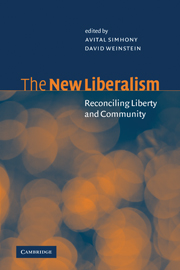Book contents
- Frontmatter
- Contents
- List of contributors
- Acknowledgments
- Introduction: The new liberalism and the liberal–communitarian debate
- 1 Liberal community: an essay in retrieval
- 2 T. H. Green on individual rights and the common good
- 3 T. H. Green's complex common good: between liberalism and communitarianism
- 4 Private property, liberal subjects, and the state
- 5 Neutrality, perfectionism, and the new liberal conception of the state
- 6 Bosanquet's communitarian defense of economic individualism: a lesson in the complexities of political theory
- 7 The new liberalism and the rejection of utilitarianism
- 8 Staunchly modern, non-bourgeois liberalism
- 9 The new liberalism and citizenship
- Select bibliography
- Index
8 - Staunchly modern, non-bourgeois liberalism
Published online by Cambridge University Press: 06 July 2010
- Frontmatter
- Contents
- List of contributors
- Acknowledgments
- Introduction: The new liberalism and the liberal–communitarian debate
- 1 Liberal community: an essay in retrieval
- 2 T. H. Green on individual rights and the common good
- 3 T. H. Green's complex common good: between liberalism and communitarianism
- 4 Private property, liberal subjects, and the state
- 5 Neutrality, perfectionism, and the new liberal conception of the state
- 6 Bosanquet's communitarian defense of economic individualism: a lesson in the complexities of political theory
- 7 The new liberalism and the rejection of utilitarianism
- 8 Staunchly modern, non-bourgeois liberalism
- 9 The new liberalism and citizenship
- Select bibliography
- Index
Summary
Introduction
The title of this chapter is, of course, a gentle tease at the expense of Richard Rorty's well-known essay on “Post-modernist bourgeois liberalism,” an essay that is itself something of a tease at the expense of the harder left's attack on middle-of-the-road social democrats and their concern for human rights and non-violent change. I have a non-teasing purpose, however, and that is to emphasize (as, of course, Rorty himself does) that Dewey's own conception of his social and political theory was that it expressed the self-understanding of modern society – “modern” being no more precise in its denotation than “post-modernist,” but certainly meaning at different times both the society that lived off and built on the scientific revolution of the seventeenth century and the society that came into existence with the capitalist industrial revolution of the eighteenth and nineteenth centuries. Dewey's beliefs about the demands of modernity provide the part of my framework that deals with modernity.
As to “non-bourgeois,” I want to emphasize in a way that many commentators on Dewey do not that he was a keenly class-conscious writer. I do not mean that he advocated the politics of class war; quite the contrary. He was, rather, gloomily conscious that the class-divided nature of capitalist societies – sometimes seeing this as a matter of owners versus workers in a more or less Marxist or Weberian style, sometimes seeing it as managers versus the managed in a way more akin to C.
- Type
- Chapter
- Information
- The New LiberalismReconciling Liberty and Community, pp. 184 - 204Publisher: Cambridge University PressPrint publication year: 2001
- 1
- Cited by



